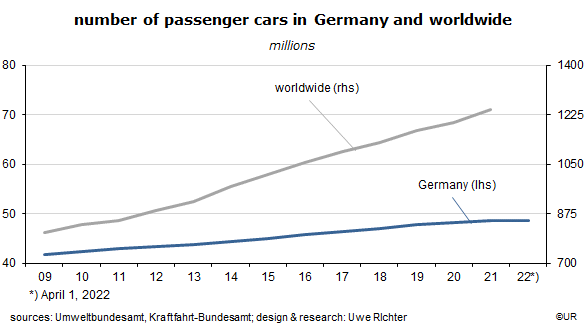
Market Commentary: Germans’ love affair with their cars not about to end
Dieter Wermuth, Economist and Partner at Wermuth Asset Management
Contrary to all forecasts, Germany’s car fleet – just as car fleets in the rest of the world – keeps expanding year by year. Neither the renaissance of the bicycle, the expansion of commuter railway systems, national rail networks or car sharing have stopped this trend, nor various recessions or the increase of gasoline prices. People love their cars and the option to hop in whenever they feel like it, and to drive wherever they want.
Ferdinand Dudenhöffer, one of the best-informed market analysts, has recently presented a new long-term forecast, published in “Wirtschaftsdienst”, the German magazine for economic policy. The fleet of passenger cars had expanded at a fairly steady annual rate of 1.3 % since 2010. He predicts that the average growth rate will be less, 0.5 %, between now and 2050. From 2030, all new cars will be electric, and the stock of combustion engine cars will be phased out over the following 20 years. He estimates that by 2050, 95 % of all cars on the road will be powered by batteries.

Under the conservative assumptions that EVs will on average be driven 13,000 kilometers a year and require 20 kWh of electricity per 100 kilometers, the fleet will need 138 TWh (Terawatt-hours) in 2050. For comparison: in 2020 Germany’s 30,000 onshore wind turbines produced only 106 TWh. Not only mobility but other sectors of the economy as well require more electricity input between now and then. If the total future supply of electricity is to be generated by onshore wind, Germany must instal another 39,000 wind turbines, in addition to the 30,000 that exist already. Green electricity, including from photovoltaic, needs a lot of space. Natural limits are approaching quickly.
Dudenhöffer therefore favors to extend the useful life of Germany’s existing nuclear power plants which are modern and, in his view, quite safe. This would certainly be better than burning fossil fuels and thus harm the environment during the transitory period. He would rather accelerate the development of so-called molten-salt-reactors. Their key feature is that, by design, nuclear melt-downs are de facto impossible, thereby removing the main risk of nuclear power plants. Sounds almost too good to be true.
Another key trend in individual mobility is roboter cars. In the US, and especially in China the mood is like during the gold rush – but less so in Germany. Chinese high-tech companies from various sectors of the economy as well as several giga metro areas are competing to roll out new systems as fast as possible in order to realize economies of scale and thus achieve natural monopolies. There are already SUVs with a starting price of $45,000 whose computers can perform 200 trillion operations per second (200,000,000,000,000/sec!). Dudenhöffer expects that the risks of driverless travel will be reduced so much that we will see 108-year old great-grandmothers and 8-year old kids operate these technological marvels.
At the moment, costs and prices of roboter cars are still prohibitively high. But we know that this will change over time, as with all revolutionary technologies. Will German and other European firms respond before the market is divided up?
###
For more information please contact:
Instinctif Partners
Lars Hofer // Johanna Franck
E lars.hofer@instinctif.com // johanna.franck@instinctif.com
T +49 162 562 8917 // +49 69 133 896-24
Visit us: https://wermutham.com/
Follow us on Twitter and LinkedIn
About Wermuth Asset Management
Wermuth Asset Management (WAM) is a Family Office which also acts as a BAFIN-regulated investment consultant.
The company specializes in climate impact investments across all asset classes, with a focus on EU “exponential organizations” as defined by Singularity University, i.e., companies which solve a major problem of humanity profitably and can grow exponentially. Through private equity, listed assets, infrastructure and real assets, the company invests through its own funds and third-party funds. WAM adheres to the UN Principles of Responsible Investing (UNPRI) and UN Compact and is a member of the Institutional Investor Group on Climate Change (IIGCC), the Global Impact Investing Network (GIIN) and the Divest-Invest Movement.
Jochen Wermuth founded WAM in 1999. He is a German climate impact investor who served on the steering committee of “Europeans for Divest Invest”. As of June 2017, he was also a member of the investment strategy committee for the EUR 24 billion German Sovereign Wealth Fund (KENFO).
Legal Disclaimer
The information contained in this document is for informational purposes only and does not constitute investment advice. The opinions and valuations contained in this document are subject to change and reflect the viewpoint of Wermuth Asset Management in the current economic environment. No liability is assumed for the accuracy and completeness of the information. Past performance is not a reliable indication of current or future developments. The financial instruments mentioned are for illustrative purposes only and should not be construed as a direct offer or investment recommendation or advice. The securities listed have been selected from the universe of securities covered by the portfolio managers to assist the reader in better understanding the issues presented and do not necessarily form part of any portfolio or constitute recommendations by the portfolio managers. There is no guarantee that forecasts will occur.
Read the full article in PDF format here: English.